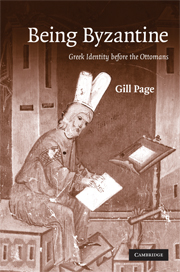Book contents
- Frontmatter
- Contents
- List of illustrations
- Acknowledgements
- A note on the use and transliteration of Greek
- Abbreviations
- Reference works
- Introduction: The Frankish conquest of Greece
- 1 Ethnic identity?
- 2 Byzantine identities
- 3 Niketas Choniates
- 4 The thirteenth century: ambition, euphoria and the loss of illusion
- 5 The nightmare of the fourteenth century
- 6 Meanwhile, a long way from Constantinople …
- 7 The long defeat
- 8 Roman identity and the response to the Franks
- Glossary
- Map 1 The Aegean region
- Map 2 The Peloponnese
- Appendix 1 Key content items
- Appendix 2 The origins of the Chronicle of the Morea
- Bibliography
- Index
6 - Meanwhile, a long way from Constantinople …
Published online by Cambridge University Press: 24 November 2009
- Frontmatter
- Contents
- List of illustrations
- Acknowledgements
- A note on the use and transliteration of Greek
- Abbreviations
- Reference works
- Introduction: The Frankish conquest of Greece
- 1 Ethnic identity?
- 2 Byzantine identities
- 3 Niketas Choniates
- 4 The thirteenth century: ambition, euphoria and the loss of illusion
- 5 The nightmare of the fourteenth century
- 6 Meanwhile, a long way from Constantinople …
- 7 The long defeat
- 8 Roman identity and the response to the Franks
- Glossary
- Map 1 The Aegean region
- Map 2 The Peloponnese
- Appendix 1 Key content items
- Appendix 2 The origins of the Chronicle of the Morea
- Bibliography
- Index
Summary
THE PELOPONNESE AND THE CHRONICLE OF THE MOREA
In the last three chapters, a close analysis of the histories of Choniates, Akropolites, Pachymeres, Gregoras and Kantakouzenos made it possible to access something of the perspectives and attitudes of the exceptionally well educated men who dominated the small Byzantine Roman elite. Of them all, though, only Akropolites ever lived under Latin rule, and that only as a child in Constantinople in the years to 1233. In contrast, the records and history of the Frankish principality of Achaia in the Peloponnese provide a view into developments in provincial Roman identities under the direct pressure of the western presence. The discussion in Chapter 2 outlined how, in various ways and for various reasons, the nature of Roman identity among the provincials who became subject to Frankish rule after 1204 differed markedly from that felt or professed by the privileged elite of Constantinople. In the farther-flung provinces like the Peloponnese, which had already become considerably alienated from the capital before the Frankish conquest, it is possible to see the growing significance of an ethnic understanding of what it meant to be Roman. This ethnic identity included the non-ecumenical understanding of Roman Christianity and stood in contrast to the political Roman identity. Moreover, the political Roman identity, contrasting with the barbarian, clearly possessed minimal resonance in the distant provinces.
- Type
- Chapter
- Information
- Being ByzantineGreek Identity Before the Ottomans, 1200–1420, pp. 177 - 242Publisher: Cambridge University PressPrint publication year: 2008

